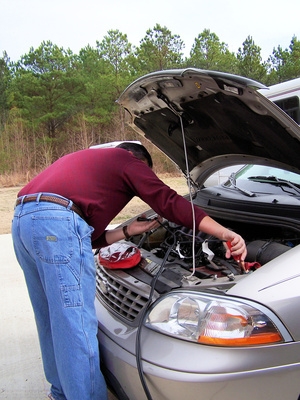
Without an adequate charge, a car battery will be too weak to start your vehicle when you turn the ignition key. Modern-day autos always are drawing a small amount of power from the battery, even when the car has been shut off. That is because certain operations in the vehicle never are supposed to stop. The dashboard clock, for example, keeps track of time regardless of whether the car's engine is on. But other things also can draw on the battery. If they consume too much of the charge, you might find yourself needing a jump-start to revive a dead battery..
Forgetting to turn off a car's headlights after shutting down the vehicle is fairly common, but this kind of forgetfulness can prove troublesome. Leaving the headlights on when the car is not running will drain a significant amount of the battery's charge. Depending on how long the headlights stay on, you might return to a vehicle with a battery that is too weak to power up the engine. Some newer car models will play a certain sound to notify the driver that the headlights are still on even though the car's engine is off. Some cars offer another kind of safeguard: headlights that will automatically extinguish themselves a few minutes after the ignition is turned off.

Failing to fully close a car door or the trunk lid also can drain some of the energy from a car battery after the vehicle's engine shuts down. The problem generally is not the door or the trunk lid itself, but rather the interior lights that will continue to burn as long as the door or trunk remain open. Even a simple dome light left on by accident will draw enough power from the battery to drain it in a day or two, leaving the battery incapable of starting the car.

Drivers and passengers often use a car's accessory socket to recharge a cell phone or to provide power for other items, such as a portable video game or an MP3 player. The accessory socket is located in the space formerly occupied by a car's cigarette lighter. Keeping electronic items plugged in and operating, even after the car has been shut off, can drain a car battery enough to prevent it from starting the engine again later.

A car battery might lose some of its charge for other reasons. An electrical short or an accessory that is not functioning properly could cause excessive drain on a battery. Another possibility is that the switch or relay for a rear window defogger might get stuck in the "on" position, which would draw power from the battery even after the engine is turned off. Remedying these kinds of problem may require professional assistance.